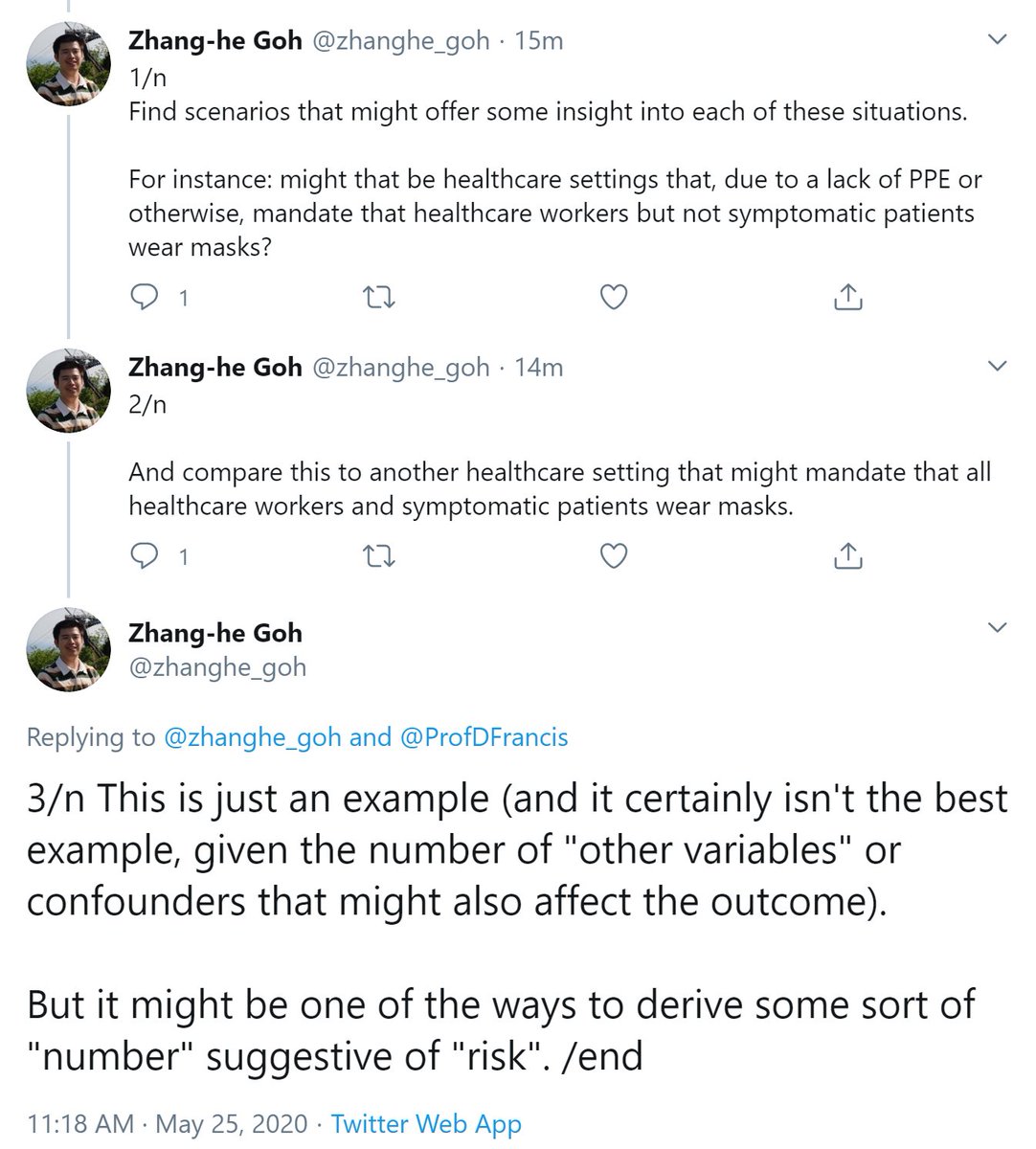What should you do when you see something that supports your beliefs? (H/T to @LCC_DrMalik )
Do you *think* wearing a facemask reduces transmission of Covid?
Here is Iqbal& #39;s enquiry.
It fits my preconceptions, just as it probably fits yours.
And it adds a nice degree of numerical solidity.
And it adds a nice degree of numerical solidity.
"The most harmful ideas in the world are not the crazy ones.
They are the sensible ideas that turn out to be wrong."
Galileo Galilei
Eppur Si Muove J, 2020
They are the sensible ideas that turn out to be wrong."
Galileo Galilei
Eppur Si Muove J, 2020
I am surprised how often people ask for my opinions on things. My opinion is no better than anyone else& #39;s opinion.
I would encourage everyone to learn, not from my opinion, but from my APPROACH to answering questions.
Step 1.
Do we care about the effect on masks on covid?
I would encourage everyone to learn, not from my opinion, but from my APPROACH to answering questions.
Step 1.
Do we care about the effect on masks on covid?
Good. I am glad you are not a Covid Denier.
Step 2.
Think "How would I set about measuring the effect of masks on covid infection, to produce the three numbers shown?"
Suggestions welcome...
Step 2.
Think "How would I set about measuring the effect of masks on covid infection, to produce the three numbers shown?"
Suggestions welcome...
In particular, would you randomize, or use observational data?
If you chose Observational,
How will you ensure that the people without masks had
(a) the same distances as with-mask people
(b) the same duration of contact
(c) the same susceptibility to Covid
How will you ensure that the people without masks had
(a) the same distances as with-mask people
(b) the same duration of contact
(c) the same susceptibility to Covid
How would you test for Covid?
Symptoms?
Tests? (Which? Swab? Antibody?)
Symptoms and Tests?
Symptoms?
Tests? (Which? Swab? Antibody?)
Symptoms and Tests?
And if you chose Randomize, then
(a) Where would you get people who agree to be randomized?
(b) How would you ensure they adhere to their allocation?
(c) How would you ensure the non-maskies maintain the same exposure as the maskies?
(a) Where would you get people who agree to be randomized?
(b) How would you ensure they adhere to their allocation?
(c) How would you ensure the non-maskies maintain the same exposure as the maskies?
And the killer question, if it was Randomized, where is it on clinical trials dot gov?
Was there an RCT on this subject?
How would an observational study have dealt with differential (a) Characteristics of people choosing to mask-or-not-mask (b) Behaviour after they decided to mask-or-not-mask, and how would it have (c) collected infection rates?
I don& #39;t think there have been any reported RCTs on facemasks for COVID, but there have been RCTs for other viruses.
Source from Cochrane: https://www.ncbi.nlm.nih.gov/pmc/articles/PMC6993921/">https://www.ncbi.nlm.nih.gov/pmc/artic...
Source from Cochrane: https://www.ncbi.nlm.nih.gov/pmc/articles/PMC6993921/">https://www.ncbi.nlm.nih.gov/pmc/artic...
Excellent suggestion for an observational approach from @zhanghe_goh
The problem is the confounders. Hospitals with facemasks may be different from those without, in multiple ways.
And remember the image was for general-public saliva-catching facemasks, not our PPE nozzle-masks
The problem is the confounders. Hospitals with facemasks may be different from those without, in multiple ways.
And remember the image was for general-public saliva-catching facemasks, not our PPE nozzle-masks
1. The confounders could easily be large, and swamp any effect of the masks.
2. If we saw an effect in the direction we expected, we would publish. If it was in the opposite direction, we would laugh, and say "obviously confounded".
2. If we saw an effect in the direction we expected, we would publish. If it was in the opposite direction, we would laugh, and say "obviously confounded".
So the combination of
wide variation in the results between observational studies (resulting from the wide variation in directions and sizes of biases)
and
non-publication of obviously nonsensical "backwards" results
...
wide variation in the results between observational studies (resulting from the wide variation in directions and sizes of biases)
and
non-publication of obviously nonsensical "backwards" results
...
would lead to the literature containing exclusively the forwards-associations and perhaps some neutral studies.
Therefore, regardless of whether facemasks work or not, the meta-analysis of the observational studies would be STRONGLY positive.
The ease of conducting a study, particularly if it is a low quality study, makes the problem worse, not better.
The ease of conducting a study, particularly if it is a low quality study, makes the problem worse, not better.
OK two more pieces of evidence to take into account.
When reporting findings, would you use
When reporting findings, would you use

 Read on Twitter
Read on Twitter




